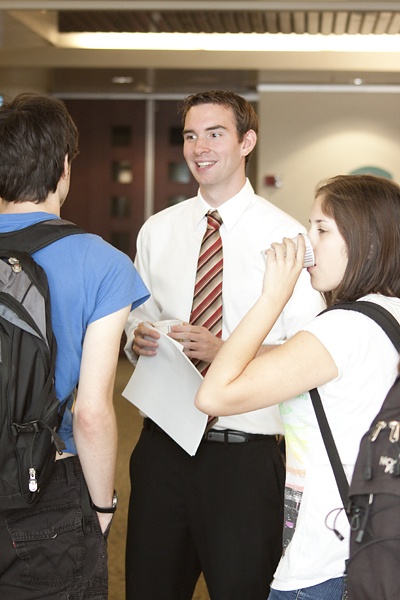ASI comes up short on voter turnout goals in election

Terry Martin :ASI President Terry Martin stays after his address to discuss student concerns with Erik Skinner a 3rd year Government Major and Ally Lodwig a 2nd year speech Pathology major:Brittany Bradley – State Hornet
May 31, 2011
When Associated Students Inc. President Terry Martin won in last year’s ASI election, he was ecstatic.
Martin and several other members of the student political party Vote Impact! jumped into the Serna Plaza water fountain in celebration of their near-sweep of the ASI elections.
“I’m just so happy right now,” Martin said. “This was the result of three years of involvement in ASI and clubs and organizations. I am just so happy that the students chose me.”
Voter election turnouts reveal that 2,356 students of the 27,033 eligible students voted in last year’s elections, or about 9 percent of the student body. Of that number, Martin received 905 votes – 40 percent of the student voters, or about 3 percent of the entire student body.
Martin is not the only ASI president to have won in a year with low voter turnout. In fact, voter turnout in the past seven ASI elections has ranged from a low of 6 percent to a high of 14.2 percent.
This year, 13 percent of voters turned out at the polls or voted online, or 3,264 of 26,803 eligible students. ASI was trying reach a goal of 20 percent.
The numbers caught the attention of this year’s ASI Board, which started a campaign to bring awareness to the issue. ASI signs on campus point out that “27,033 students complained; 2,356 voted.”
“It was highlighting that there is a lot of stuff going on campus and at the state level,” said Dwayne Carter, ASI marketing consultant. “A lot of people have expressed themselves, but not taken action and voted.”
But Carter pointed out that voter turnout at Sac State in ASI elections is on par with other schools.
However, 5,000 of Fresno State’s more than 15,000 students to voted in its election.
Martin said it is important for students to vote, because ASI makes many important decisions concerning student life on campus.
“If you don’t vote in the ASI elections, you’re saying, ‘You can go ahead and decide for me,’ allowing others to go and vote in their stead,” he said. “If I were to say that ASI is a company, which it basically is, I think it’s a responsibility for students to vote as shareholders.”
Martin said students should also vote because they pay a $60 per semester ASI fee.
The ASI budget, made up entirely of student fees, for the 2010-11 school year is $6.6 million. With this money, ASI operates many student services that such as the Children’s Center, Peak Adventures, the Aquatic Center, the Safe Rides program and KSSU Radio, among several others.
Sac State government professor James Shoch said despite the low voter turnout, ASI still remains representative of the student body.
“Since the elections are open to all students, the fact that so few actually vote doesn’t make the ASI illegitimate,” Shoch said.
ASI Executive Vice President Rylan Gervase said he feels ASI elections are legitimate despite the low numbers of student voters.
“Compared to the 56 percent of the U.S., which voted in the 2008 presidential election, that number seems low indeed,” he said. “However, it seems reasonable that if barely half of the U.S. can turn out to vote in one of the most historic presidential elections in recent history, turnout at the annual Sac State ASI elections is considerably lower.”
Shoch said students likely do feel ASI elections are not important enough. He said this feeling is compounded by the fact that most Sac State students commute to campus, and do not feel as connected to the university.
“Young people participate at very low level in all forms of politics,” Scoch said. “They haven’t yet developed the stake and level of knowledge to compel greater involvement. ASI doesn’t have all that much to do with the totality of students’ lives, making them even less likely to participate in ASI elections than in other forms of politics.”
Though Shoch believes ASI is legitimate, he said with such low voter turnout, ASI cannot claim that students fully support their platforms.
Gervase said because his slate, Vote Impact!, won 13 of the 15 positions, students did mandate their polices.
“To win so overwhelmingly across a diverse cross-section of the student body seems to be a mandate to me, regardless of turnout,” he said. “If any student felt strongly for or against our policies, he or she had the right to vote for or against us.”




























































































































